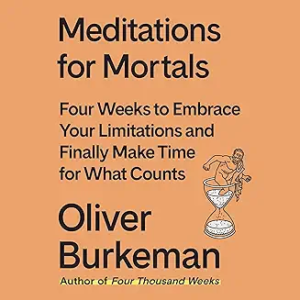Meditation for Mortals: Four Weeks to Embrace our Limitations and Make Time for What Counts by Oliver Burkeman 2024
Among the many practices that are related to my reading, two of them relate to this book. First, I NEVER read self-help books. Typically they are oversimplified, cliched approaches to issues that are either trivial or far too complex to lend themselves to an easy formuala—-personal appearance, weight, efficiency, happiness, immortality, etc.
A second practice, is that I try to meditate for 15 minutes each day and try to read a book about meditation every month or two. Again, I find that many of these books are simplistic and rote repitition of the same old “be awake, focus on your breath, etc.”, but I usually glean one or two nuggets from each of those books and can apply it to my practice.
Hence, when I saw this book on a shelf at the CPL, I thought it was about meditation. Surprisingly, it not only failed to address meditation at all, and worse than that, it’s actually a self-help book promising in its very first sentence that “the world opens up once you realize you’re never going to sort your life out.” Ironically, among the 28 days in Burkeman’s plan for ‘making time for what counts’, meditation isn’t even mentioned!
Nonetheless, this book does have several important points to make and it makes them well. Burkeman, a journalist with three earlier books, points out that it is the drive for perfection that is largely responsible for today’s anxious and overwhelmed individuals. He urges us to embrace ‘imperfectionism” as a way of avoiding missing out on today’s joy while we’re busily emptying our inboxes, crossing items off our to-do lists, endlessly checking the latest headlines and stock market quotes (what Burkeman refers to as ‘doomscrolling’), and checking off the boxes on the latest blog promising success and happiness.
I read the book straight through eschewing the suggested ‘one chapter per day’ in favor of checking the ‘read this’ box and crossing this title off my ‘to do list’. Did I learn something to take to my meditation practice? To my surprise, the answer is yes. Perhaps it was the message to make time, chill out, just relax, and take the world as it comes to you. Spending lots of time planning for the future that is always a surprise is somewhat futile. Regretting the past is useless. Be present; be awake; be aware; enjoy the ride. This is not a dress rehearsal. These are all good, albeit common sense, recommendations, but bear repeating.
One of the elements of this book that I enjoyed were the quotes at the beginning of each chapter. Two favorites were William James’ observation that “The art of being wise is the art of knowing what to overlook” and Hannah Arendt’s that “….constantly bound by craving and fear to a future full of uncertainties, we strip each present moment of its calm, its intrinsic import, which we are unable to enjoy. And so, the future destroys the present.” And here’s a brilliant observation by Samuel Butler, the 19th C. British novelist who wrote “The Way of All Flesh”: “Life is like playing a violin solo in public and learning the instrument as one goes on.”
Perhaps one wag said it best. Don’t sweat the small stuff. Everything is small stuff. I may have to re-evaluate my approach to self-help books. This was a good one.



